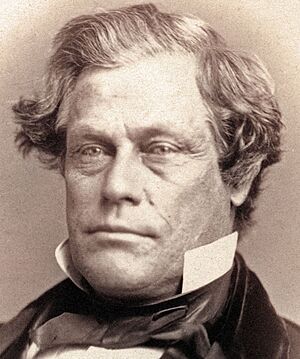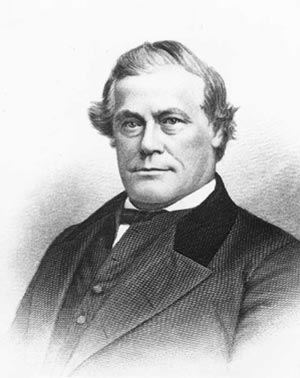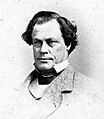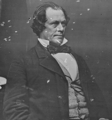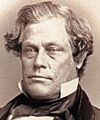Owen Lovejoy facts for kids
Quick facts for kids
Owen Lovejoy
|
|
|---|---|
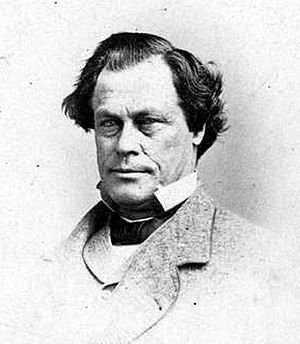
Lovejoy (1850s) by J. Gurney & Son
|
|
| Member of the U.S. House of Representatives from Illinois |
|
| In office March 4, 1857 – March 25, 1864 |
|
| Preceded by | Jesse O. Norton |
| Succeeded by | Ebon C. Ingersoll |
| Constituency | 3rd district (1857–1863) 5th district (1863–1864) |
| Personal details | |
| Born | January 6, 1811 Albion, Maine, U.S. |
| Died | March 25, 1864 (aged 53) Brooklyn, New York, New York, U.S. |
| Political party | Republican |
| Spouse | Eunice Lovejoy |
| Relations | Elijah Lovejoy (brother) Joseph Cammett Lovejoy (brother) Nathan A. Farwell (cousin) |
| Residence | Princeton, Illinois |
| Alma mater | Bowdoin College |
| Occupation | Minister |
| Signature | |
| Website | BioGuide |
Owen Lovejoy (January 6, 1811 – March 25, 1864) was an important American leader. He was a Congregational minister, a lawyer, and a strong opponent of slavery, known as an abolitionist. He later became a Republican congressman from Illinois.
Lovejoy was also a "conductor" on the Underground Railroad. This was a secret network that helped enslaved people escape to freedom. After his brother, Elijah Parish Lovejoy, was killed in 1837 by people who supported slavery, Owen became a key leader for abolitionists in Illinois. He spoke out against slavery and helped many runaway slaves find their way to freedom. He was also a close friend of Abraham Lincoln.
Contents
Early Life and Education
Owen Lovejoy was born in Albion, Maine, in 1811. He was one of five brothers. His parents were Elizabeth (Patee) and Daniel Lovejoy, who was a minister and farmer. Owen worked on the family farm until he was 18 years old. His parents strongly encouraged him to get an education.
He attended Bowdoin College from 1830 to 1833. He studied law there, but he never worked as a lawyer.
Fighting for Freedom: Owen Lovejoy's Career
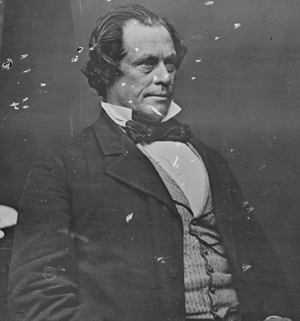
Owen Lovejoy moved to Alton, Illinois. His older brother, Elijah Parish Lovejoy, had moved there in 1836. Elijah had faced problems in St. Louis because of his anti-slavery work. Elijah was a Presbyterian minister and ran an abolitionist newspaper called the Alton Observer. Owen studied theology in Alton.
Brother's Sacrifice and a Promise
On November 7, 1837, Owen was there when his brother Elijah was killed. Elijah was trying to protect the printing press of the Illinois Anti-Slavery Society from an angry mob. Owen reportedly promised on his brother's grave that he would "never forsake the cause" of fighting slavery.
Owen and his brother Joseph C. Lovejoy wrote a book called Memoir of Elijah P. Lovejoy (1838). This book was shared widely by the American Anti-Slavery Society. It helped make Elijah famous after his death and brought more support to the anti-slavery movement.
Minister and Anti-Slavery Organizer
From 1838 to 1856, Lovejoy served as the pastor of the Congregational Church in Princeton, Illinois. During these years, he also helped start many of the 115 anti-slavery Congregational churches in Illinois. These churches were part of the American Missionary Association, which began in 1846. His work made him more well-known to the public.
Entering Politics and Friendship with Lincoln
In 1854, Lovejoy was elected to the Illinois State Legislature. He worked with Abraham Lincoln and others to create the Republican Party in Illinois. He and Lincoln remained close friends throughout their lives.
In 1856, Lovejoy was elected as a Republican to the U.S. House of Representatives from Illinois. He served in Congress from March 4, 1857, until his death in 1864.
Speaking Out Against Slavery
In February 1859, some politicians accused Lovejoy of being a "negro stealer" because he helped runaway slaves. Lovejoy bravely responded in Congress, saying:
Proclaim it upon the house-tops! Write it upon every leaf that trembles in the forest! Make it blaze from the sun at high noon and shine forth in the radiance of every star that bedecks the firmament of God. Let it echo through all the arches of heaven, and reverberate and bellow through all the deep gorges of hell, where slave catchers will be very likely to hear it. Owen Lovejoy lives at Princeton, Illinois, three-quarters of a mile east of the village, and he aids every fugitive that comes to his door and asks it. Thou invisible demon of slavery! Dost thou think to cross my humble threshold, and forbid me to give bread to the hungry and shelter to the houseless? I bid you defiance in the name of my God.
Lovejoy was a strong speaker who supported Abraham Lincoln during his famous debates with Stephen A. Douglas. In Congress, Lovejoy introduced the bill that finally ended slavery in the District of Columbia. This had been a long-term goal of the American Anti-Slavery Society. He also helped pass laws that stopped slavery in new territories.
He was one of the few members of Congress who always supported Lincoln during the American Civil War. Lincoln once said, "To the day of his death, it would scarcely wrong any other to say, he was my most generous friend."
A Fiery Speech in Congress
On April 5, 1860, Lovejoy gave another powerful speech in the U.S. House of Representatives. He criticized Democrats and their reasons for supporting slavery. He said that enslaving people because they were seen as "inferior" was like hurting someone who is weak or a child.
During this speech, several Democrats became very angry. They threatened Lovejoy with pistols and canes. Republicans present promised to defend Lovejoy if he was attacked. Lovejoy stood firm and said, "I will stand where I please" and "Nobody can intimidate me." The next day, his speech was printed in 55 newspapers across the country.
Later Life and Death
Owen Lovejoy died in Brooklyn, New York, in 1864. His body was brought back to Illinois and buried at Oakland Cemetery in Princeton. When he died, Lincoln said, "I've lost the best friend I had in the house [of representatives]."
Legacy
- The city of Princeton takes care of and preserves his home, the Owen Lovejoy House. It is now a house museum. In 1997, it was named a National Historic Landmark as part of the Underground Railroad. The house has a secret room where slaves could hide. It is open for people to visit.
- After his death, a tall monument called an obelisk was built in Princeton to honor him. President Lincoln wrote a letter saying, "Let him have his marble monument along with the well assured and more enduring one in the hearts of all those who love Liberty unselfishly and for all."
Images for kids
See also
 In Spanish: Owen Lovejoy para niños
In Spanish: Owen Lovejoy para niños
- List of United States Congress members who died in office (1790–1899)
 | Dorothy Vaughan |
 | Charles Henry Turner |
 | Hildrus Poindexter |
 | Henry Cecil McBay |


